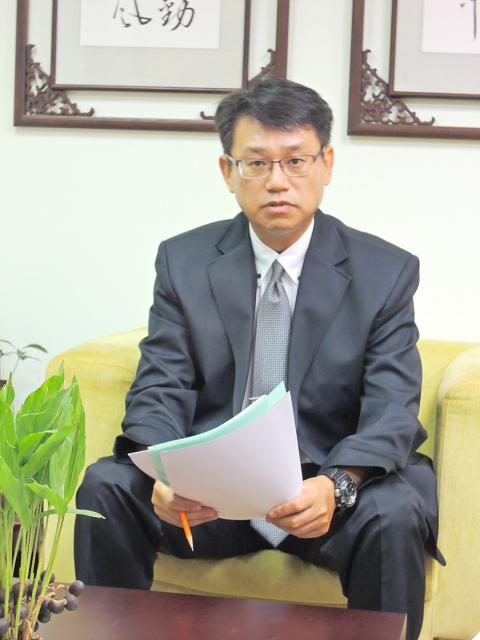The Kaohsiung District Court yesterday sentenced three naval officers to prison terms ranging from 14 months to two years over the mistaken launch of a missile that killed a fishing boat captain and injured three others in waters off Penghu County last year.
The officers were convicted on charges of causing death by negligence, the court said in its ruling.
Petty Officer Second Class Kao Chia-chun (高嘉駿), who fired the Hsiung Feng III anti-ship missile on July 1 last year, was sentenced to 18 months in prison.

Photo: Huang Chien-hua, Taipei Times
Kao’s supervisor, Chief Petty Officer Chen Ming-hsiu (陳銘修), was sentenced to two years, while Lieutenant Junior Grade Hsu Po-wei (許博為), who was in charge of weapons on the Chinchiang-class corvette, was jailed for 14 months.
The locally developed missile was mistakenly launched from the corvette docked at a naval base in Kaohsiung during what was supposed to be a simulated test.
The missile traveled northwest and ripped through the fishing boat Hsiang Li Sheng 40 nautical miles (74km) off Penghu, killing its captain, Huang Wen-chung (黃文忠), and injuring Huang’s son and two migrant workers on board.
On the morning of July 1, Chen requested four “fuse” safety connectors from Hsu to simulate a missile launch, the court said.
Hsu agreed to Chen’s request, even though he should have known that only two of the Hsiung Feng III missiles on the corvette had test and training sets (TTS) installed and only two safety connectors were needed for the test, it said.
After obtaining the connectors, Chen ordered his subordinates to link them to the four Hsiung Feng III missiles, even though he knew that two of the missiles did not have TTS on them, the court added.
After completing a missile circuit test, Chen did not notice that the missile control system was set to “combat mode” instead of “training mode,” it said.
He then left the war room for five to seven minutes, leaving Kao alone in the room simulating the missile launch procedure, it added.
Kao did not notice that two of the missiles were in “live-fire” mode and pressed the launch button for the No. 3 missile, the court said.
The missile traveled for about two minutes before reaching waters near Penghu, where it automatically searched for a target and ripped through the fishing boat.
Kao admitted to his negligence after the incident, while Chen and Hsu denied any wrongdoing, the court said in its verdict.
When asked why Kao received a lighter sentence, judge Yeh Wen-po (葉文博) said the degree of Chen’s negligence was more severe and he has refused to admit any wrongdoing, leading to the heavier sentence.
Huang Wen-chung’s family received state compensation of more than NT$30 million (US$989,936 at the current exchange rate) following the incident and reached a settlement with the Ministry of National Defense.
The Navy Command Headquarters yesterday released a statement saying that it respects the court’s ruling and would provide legal assistance to the officers.
Kao’s lawyer said Kao will decide whether to appeal after receiving the official verdict.

DAREDEVIL: Honnold said it had always been a dream of his to climb Taipei 101, while a Netflix producer said the skyscraper was ‘a real icon of this country’ US climber Alex Honnold yesterday took on Taiwan’s tallest building, becoming the first person to scale Taipei 101 without a rope, harness or safety net. Hundreds of spectators gathered at the base of the 101-story skyscraper to watch Honnold, 40, embark on his daredevil feat, which was also broadcast live on Netflix. Dressed in a red T-shirt and yellow custom-made climbing shoes, Honnold swiftly moved up the southeast face of the glass and steel building. At one point, he stepped onto a platform midway up to wave down at fans and onlookers who were taking photos. People watching from inside

A Vietnamese migrant worker yesterday won NT$12 million (US$379,627) on a Lunar New Year scratch card in Kaohsiung as part of Taiwan Lottery Co’s (台灣彩券) “NT$12 Million Grand Fortune” (1200萬大吉利) game. The man was the first top-prize winner of the new game launched on Jan. 6 to mark the Lunar New Year. Three Vietnamese migrant workers visited a Taiwan Lottery shop on Xinyue Street in Kaohsiung’s Gangshan District (崗山), a store representative said. The player bought multiple tickets and, after winning nothing, held the final lottery ticket in one hand and rubbed the store’s statue of the Maitreya Buddha’s belly with the other,

‘NATO-PLUS’: ‘Our strategic partners in the Indo-Pacific are facing increasing aggression by the Chinese Communist Party,’ US Representative Rob Wittman said The US House of Representatives on Monday released its version of the Consolidated Appropriations Act, which includes US$1.15 billion to support security cooperation with Taiwan. The omnibus act, covering US$1.2 trillion of spending, allocates US$1 billion for the Taiwan Security Cooperation Initiative, as well as US$150 million for the replacement of defense articles and reimbursement of defense services provided to Taiwan. The fund allocations were based on the US National Defense Authorization Act for fiscal 2026 that was passed by the US Congress last month and authorized up to US$1 billion to the US Defense Security Cooperation Agency in support of the

HIGH-TECH DEAL: Chipmakers that expand in the US would be able to import up to 2.5 times their new capacity with no extra tariffs during an approved construction period Taiwan aims to build a “democratic” high-tech supply chain with the US and form a strategic artificial intelligence (AI) partnership under the new tariffs deal it sealed with Washington last week, Taipei’s top negotiator in the talks said yesterday. US President Donald Trump has pushed Taiwan, a major producer of semiconductors which runs a large trade surplus with the US, to invest more in the US, specifically in chips that power AI. Under the terms of the long-negotiated deal, chipmakers such as Taiwan Semiconductor Manufacturing Co (TSMC, 台積電) that expand US production would incur a lower tariff on semiconductors or related manufacturing